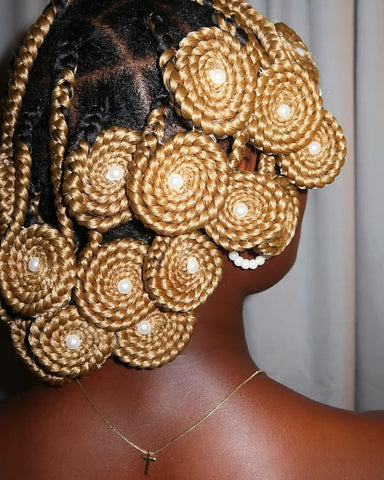Koroba And Kipetaka Braids: A Revival of African Heritage in 2024

In the realm of beauty and fashion, trends often come full circle, reclaiming their roots and breathing new life into present day trends. In 2024, one such resurgence is taking place with the revival of Koroba braids. From their rich African origins to their contemporary adaptations, Koroba braids are redefining hairstyles and reclaiming their place in the spotlight.
African Heritage of Koroba and Kipetaka Braids

Koroba braids trace their origins back to the Yoruba Tribe of Nigeria, West Africa, where they have been a part of traditional hairstyling for centuries. In the Yoruba language, 'Koroba' translates to 'Calabash/Basket,' and this hairstyle emulates the shape of an inverted calabash, beginning at the crown of the head and extending down the sides. Individuals acquainted with this style from their childhood may reminisce about the tension it exerts on the scalp, yet its charm remains irresistible, particularly when embellished with beads or gemstones.

While the braids with swirl variation added to the ends is called- Kipetaka and it originates from Madagascar, an island country in the southeastern Africa. Several adaptations involve integrating beads, shells, or vibrant threads, rendering each 'Kipetaka' a unique and personalized masterpiece.
Both hairstyles and similar and can be used together.
The significance of braids in African history cannot be overstated. Different regions and ethnic groups had their own unique braiding techniques, with each style carrying its own symbolism and cultural significance. Koroba braids, characterized by their intricate patterns and distinctive three-dimensional appearance, were particularly popular.

Koroba Braids and Black History Month
As we celebrate Black History Month, the resurgence of Koroba braids is a powerful reminder of the enduring legacy and cultural resilience of African American communities. Through hairstyles like Koroba braids, Black individuals are reclaiming their heritage and celebrating the beauty of their natural hair.
In a world where Eurocentric beauty standards have often marginalized Black hairstyles, embracing Koroba braids is a statement of pride and empowerment. This revival of Koroba braids serves as an opportunity to educate others about the significance of braids to the black community and the importance of cultural preservation.
It's a time to celebrate the diversity of Black beauty.
Trending Koroba/ Kipetaka Braid Styles of 2024:
In 2024, Koroba braids are making a bold comeback, with modern twists and innovative variations that reflect contemporary tastes and preferences. Here are some of the trending Koroba braid styles that are capturing attention:
1. Jumbo Koroba Braids:
These larger-than-life braids make a statement with their voluminous size and bold patterns. Jumbo Koroba braids are perfect for those who want to add drama and flair to their look.
2. Colorful Kipetaka Braids:

Adding pops of color to Koroba braids is a popular trend in 2024. From vibrant hues to pastel tones, incorporating colorful extensions or highlights can elevate the look and make a bold fashion statement.
3. Koroba Braided Cornrows:

Koroba braided updos offer versatility and sophistication.
4. Layered Kipetaka Braids:
Layering different lengths of braids creates a dynamic and visually interesting hairstyle. Layered Koroba braids add texture and dimension to the hair, giving it depth and movement.
5. Accessorized Koroba Braids:

Accessories such as beads, cowrie shells, and metallic cuffs are being used to embellish Koroba braids, adding an extra layer of style and personality. These adornments not only enhance the aesthetic appeal but also pay homage to traditional African jewelry and adornments.
In conclusion, the resurgence of Koroba braids in 2024 is a testament to the power of cultural expression. As we celebrate Black History Month, let us embrace and celebrate the varieties of Black Beauty, honoring the traditions of the past while embracing the creativity of the present.
Leave a comment